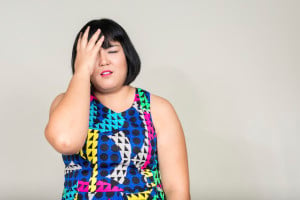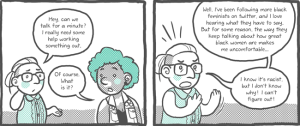Originally published on The Wip and republished here with the author’s permission.
I recently published a story about my experiences as a person who is asexual. Writing this story felt important to me because there are a lot of misconceptions about asexuality and many well-intentioned people who, consequently, have no idea how to be supportive.
While, on a basic level, asexuality is a lack of desire for sexual intimacy, there is actually quite a bit of variety among the asexual community.
Some people are neutral to sex, some are repulsed by the idea, and some actually have an interest in sex, but only in very specific circumstances, and often only within the context of a pre-existing emotionally intimate relationship.
Many people who are asexual wish the general population knew a little bit more, especially about what not to say – I certainly wish that were the case.
So I reached out to the Asexuality Visibility and Education Network (AVEN) community about the most annoying, frustrating, or offensive responses they get when they tell people they are asexual.
Their top responses are as follows:
1. Challenge Accepted!
This is the worst by far in my opinion.
At best, it’s a joke that delegitimizes our identity by suggesting asexuality is something that will just go away with a good lay. For many asexual people this is deeply confusing, because it’s difficult to know how to respond to a person who can frivolously joke about the authenticity of our identity.
At worst, it’s laden with rape culture and threatening language.
“Corrective rape” is very real for members of the LGBT and asexual communities. People actually claim to believe that rape will “fix” the perceived “problem” by, supposedly, causing the victim to enjoy their assault.
In reality, this is oppression.
This is about exerting power and nonconsensual dominance over some one as a tool to attack a part of their identity. Corrective rape happens, and being threatened with it is terrifying.
People have a right to say no to sex for any reason, and pathologizing people who simply have no sexual desire sends the message that it isn’t okay to not want sex.
That message tells us that we don’t have the right to be in control of our bodies
Instead of employing this threatening “joke,” a simple “Oh, Okay,” will do just fine. If you’re feeling compelled to respond this way, take a minute to think about why.
Is the other party’s sexuality making you feel uncomfortable or leading you to diffuse your discomfort with a joke? Do you actually feel challenged? If someone is telling you they’re asexual, they probably trust you.
Try to remember that trust and focus on how nervous the person talking to you about their sexuality might be.
2. How Do You Know If You’ve Never Tried It?
This one is almost always well meaning, but it’s hard to deal with because it puts people on the defensive.
We know in the same way that you knew you were interested in sex. We just never developed that particular interest.
For people who are asexual, the experience of being uninterested in sex can range from rarely interested or interested only in specific circumstances to complete repulsion and an overwhelming urge to vomit, but no matter what, it’s innate and something we just know.
3. No One Is Going to Want to Be With You If You Don’t Put Out!
Seriously? That’s my worth as a potential romantic partner, whether or not I have sex?
My partner, should I choose to have one, should be someone who appreciates me for who I am, not what I look like or what I offer physically. My body is for me. If I choose to share it with someone else, that’s my prerogative, but my body is not my only value.
I definitely don’t want to be in a relationship with someone who feels my asexuality is a major problem or who feels that having sex is required in a relationship.
Also, people who are asexual experience a range of feelings about romantic relationships in general. As I mentioned in my previous article, I am intertested in having emotional romantic relationships, but there are others who don’t want that closeness at all and are aromantic.
Relationships are unique, and people want different things. It’s important that the needs of each person in the relationship (whatever kind it is) are respected; this ensures that the relationship will be stronger.
By forcing or coercing people to conform to an ideal standard in any type of relationship, we are condoning oppression by refusing to recognize diverse experiences and needs.
4. Don’t Give Up on Sex Just Because of One Bad Experience
Who said anything about a bad experience?
Some people who have had negative or abusive experiences are asexual, but some of them are also very sexual. Those experiences are often unrelated.
If someone you know is asexual, it’s not safe to assume they have been victimized sexually in some way, and it’s quite frankly not your business unless they choose to talk to you about it.
5. But What About Marriage or Kids?
My choices about family planning are not really relevant to my experiences as someone who is asexual.
For people who are aromantic, marriage and often children are not on the table at all (though everyone has a different experience), but for romantic asexuals, there are a lot of options.
First, if we choose to have sex, we can; some asexuals will choose to have children using traditional methods. Others might opt for adoption or in-vitro fertilization.
Many asexuals also have wonderful and understanding spouses that may or may not be asexual themselves.
I am dating a man who respects me and is careful never to pressure me into having sex, even though he is sexual. We do occasionally engage in sex, but only when I am completely on board.
It is important to remember that there are as many relationship dynamics as there are relationships. If you are asexual or you’re a family, friend or partner of someone who is asexual, consider checking out the AVEN forums on relationships and how to be supportive.
6. You Can’t Be Asexual Because You Had Sex with _____
First off, thank you for monitoring all of my life choices for me. I’m not sure how I ever would have managed to keep track on my own.
Second, just because I chose to have sex in the past doesn’t mean I find sex remotely appealing now, or even that I found sex appealing then.
Many people who are asexual do have sex for a variety of reasons. Some feel they need to explore sex to confirm for themselves that they are asexual, others care about their sexual partner and want to make them happy. Some people become asexual at one or more points in their life.
No matter their experience, one’s actions do not necessarily determine one’s feelings.
7. Don’t You Mean ‘Celibate?’
This question is the least frustrating for me because it usually comes out of a genuine desire to understand my experience. Many people confuse asexuality and celibacy because they often lead to the same results. But there are some major differences.
Someone who is celibate is choosing to abstain for sex for any number of reasons, but does have a desire for sex. Someone who is asexual might not abstain from sex, but does not have the same drive for sex as most other people.
8. It’s Just a Phase!
While it’s true that sexuality can change over time, that is not the case for everyone and it might not be true for the person you are talking to. It’s complicated and for asexuals it’s a very real experience that at times presents an incredible challenge.
Instead of the patronizing tones, we could all benefit from understanding support – regardless of whether or not we eventually become interested in having sex.
There are a million ways to be supportive of the asexuality folks in your life, but the best way is just to remember that they are people. Our sexuality does not define who we are as people.
If we choose to tell you about being asexual, we need you to listen and to take us seriously.
For more information about asexuality, check out the Asexuality Visibility and Education Network!
[do_widget id=”text-101″]
Kirstin Kelley is graduate assistant at The WIP who is completing her master’s degree in Nonproliferation and Terrorism Studies at the Monterey Institute of International Studies.
Search our 3000+ articles!
Read our articles about:
Our online racial justice training
Used by hundreds of universities, non-profits, and businesses.
Click to learn more





















